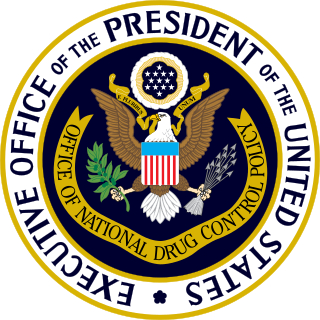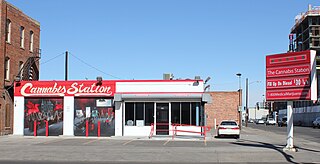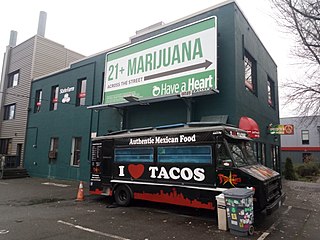The Substance Abuse and Mental Health Services Administration is a branch of the U.S. Department of Health and Human Services. It is charged with improving the quality and availability of treatment and rehabilitative services in order to reduce illness, death, disability, and the cost to society resulting from substance abuse and mental illnesses. The Administrator of SAMHSA reports directly to the Secretary of the U.S. Department of Health and Human Services. SAMHSA's headquarters building is located outside of Rockville, Maryland.

The Office of National Drug Control Policy is a component of the Executive Office of the President of the United States.
Drug Abuse Resistance Education (D.A.R.E.) is an education program that seeks to prevent use of controlled drugs, membership in gangs, and violent behavior. It was founded in Los Angeles in 1983 as a joint initiative of then-LAPD chief Daryl Gates and the Los Angeles Unified School District as a demand-side drug control strategy of the American War on Drugs.
The removal of cannabis from Schedule I of the Controlled Substances Act, the most tightly restricted category reserved for drugs that have "no currently accepted medical use," has been proposed repeatedly since 1972.

The National Institute on Drug Abuse (NIDA) is a United States federal-government research institute whose mission is to "lead the Nation in bringing the power of science to bear on drug abuse and addiction."

In the United States, the non-medical use of cannabis is decriminalized in 14 states, and legalized in another 10 states, as of April 2019. Decriminalization refers to a policy of reduced penalties for cannabis offenses, typically involving a civil penalty for possession of small amounts, instead of criminal prosecution or the threat of arrest. In jurisdictions without any penalties the policy is referred to as legalization, although the term decriminalization is sometimes broadly used for this purpose as well.

Substance Abuse Prevention, also known as drug abuse prevention, is a process that attempts to prevent the onset of substance use or limit the development of problems associated with using psychoactive's substances. Prevention efforts may focus on the individual or their surroundings. A concept known as "environmental prevention" focuses on changing community conditions or policies so that the availability of substances is reduced as well as the demand.

In the United States, the use of cannabis for medical purposes is legal in 33 states, four permanently inhabited U.S. territories, and the District of Columbia, as of January 2019. Fourteen other states have more restrictive laws limiting THC content, for the purpose of allowing access to products that are rich in cannabidiol (CBD), a non-psychoactive component of cannabis. There is considerable variation in medical cannabis laws from state to state, including how it is produced and distributed, how it can be consumed, and what medical conditions it can be used for.
Cannabis use disorder (CUD), also known as cannabis addiction or marijuana addiction, is defined in the fifth revision of the Diagnostic and Statistical Manual of Mental Disorders (DSM-5) and ICD-10 as the continued use of cannabis despite clinically significant impairment.

In the United States, the use and possession of cannabis is illegal under federal law for any purpose, by way of the Controlled Substances Act of 1970. Under the CSA, cannabis is classified as a Schedule I substance, determined to have a high potential for abuse and no accepted medical use – thereby prohibiting even medical use of the drug. At the state level, however, policies regarding the medical and recreational use of cannabis vary greatly, and in many states conflict significantly with federal law.
Smart Approaches to Marijuana is a non-profit organization based in Alexandria, Virginia, opposed to marijuana legalization and commercialization. SAM describes itself as a bi-partisan partnership that works with local, state, and federal legislators to create policies that decrease marijuana use. SAM advocates for civil penalties for marijuana use, along with mandated treatment, and supports maintaining misdemeanor and felony charges for production and distribution.

Cannabis dispensaries in the United States or marijuana dispensaries are a local government regulated physical location, typically inside a retail storefront or office building, in which a person can purchase cannabis and cannabis related items for medical or recreational use. First modeled in Amsterdam in the late 1970s where they were innocently called coffee shops, it would take the Americans more than a generation to successfully duplicate the idea of a retail cannabis storefront. Unlike the Dutch coffee shops, today dispensary customers are prevented from consuming cannabis on the site of a regulated dispensary in all known markets.

Cannabis in Washington relates to a number of legislative, legal, and cultural events surrounding the use of cannabis. On December 6, 2012, Washington became the first U.S. state to legalize recreational use of marijuana. The state had previously legalized medical marijuana in 1998. Under state law, cannabis is legal for medical purposes and for any purpose by adults over 21.

Cannabis advertising is the advertising of cannabis products to consumers by the cannabis industry through a variety of media. It is regulated by U.S. states. Some or all forms of cannabis advertising are banned in many countries.
"Nothing Happens", also called "Nothing can happen to you, too", or "Marijuana can make nothing happen to you, too", was an anti-cannabis public service announcement created by the United States Office of National Drug Control Policy (ONDCP).
"Dog's View", also called "Talking Dog", is a 2007 anti-cannabis public service announcement (PSA) created by the United States Office of National Drug Control Policy (ONDCP) as part of the Above the Influence campaign. The PSA features a dog who sits down at a kitchen counter and asks a teenage girl if she might be smoking too much marijuana. It was one of several ONDCP PSAs shown to increase cannabis consumption in teens. It has been the subject of numerous parodies and critiques, including a Joe Rogan stand-up routine, and a 2008 parody featuring Aubrey Plaza who resembles the actress in the original. The original PSA acquired over 1.1 million views on YouTube between its upload in 2008 and 2017. In 2011, Adweek profiled the PSA as one of ten that "make you want to take drugs". In 2018, it was ranked by High Times as one of the top six worst anti-cannabis ads, "hilariously inaccurate".









